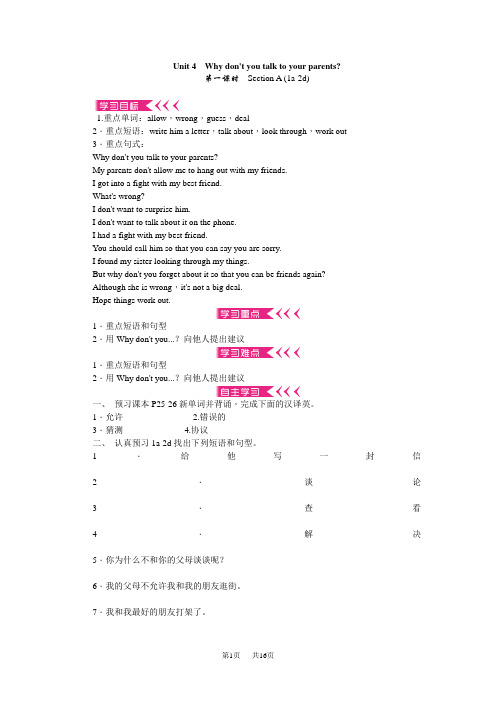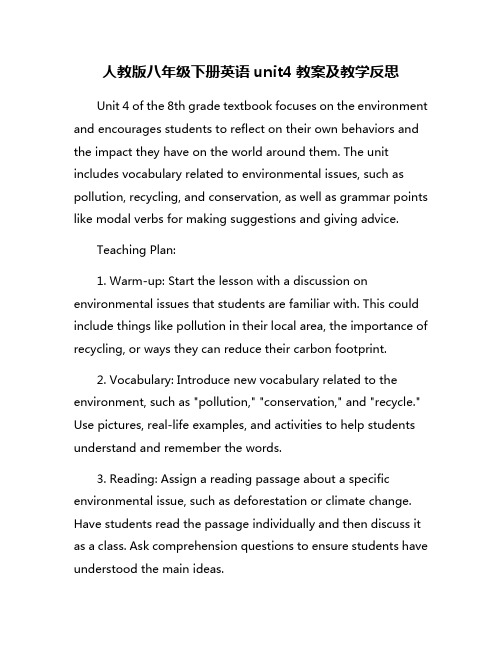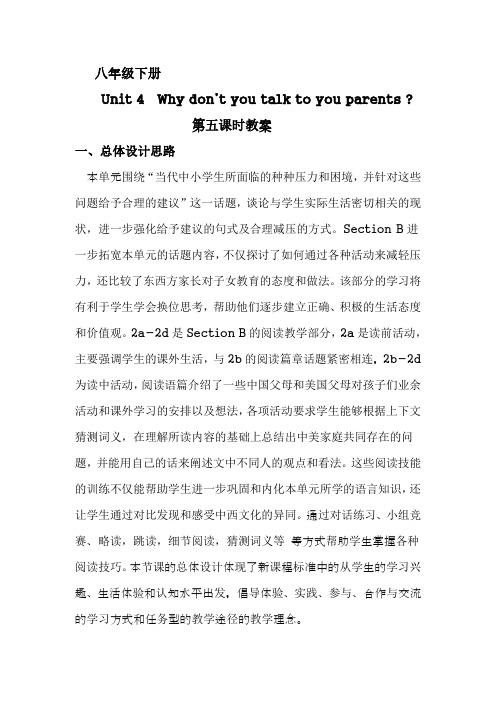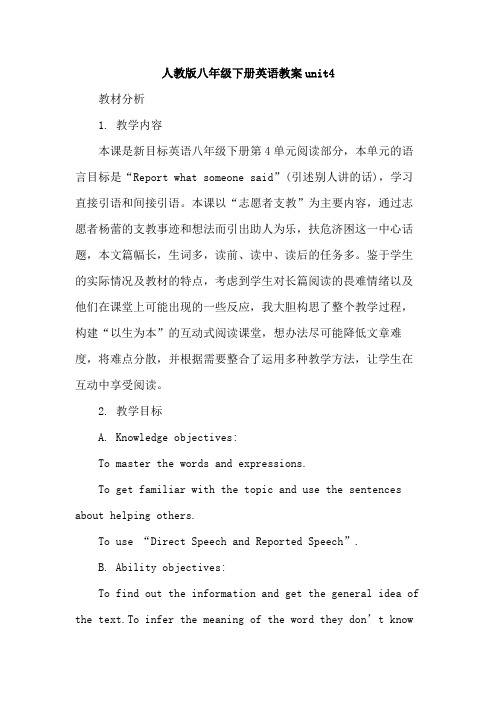新人教版八年级英语下册unit4全单元教案
人教版八年级英语下册教案(RJ) Unit 4

Unit 4Why don't you talk to your parents?第一课时Section A (1a-2d)1.重点单词:allow,wrong,guess,deal2.重点短语:write him a letter,talk about,look through,work out3.重点句式:Why don't you talk to your parents?My parents don't allow me to hang out with my friends.I got into a fight with my best friend.What's wrong?I don't want to surprise him.I don't want to talk about it on the phone.I had a fight with my best friend.You should call him so that you can say you are sorry.I found my sister looking through my things.But why don't you forget about it so that you can be friends again?Although she is wrong,it's not a big deal.Hope things work out.1.重点短语和句型2.用Why don't you...?向他人提出建议1.重点短语和句型2.用Why don't you...?向他人提出建议一、预习课本P25-26新单词并背诵,完成下面的汉译英。
1.允许____________ 2.错误的____________3.猜测____________ 4.协议____________二、认真预习1a-2d找出下列短语和句型。
人教版八年级下册英语unit4教案及教学反思

人教版八年级下册英语unit4教案及教学反思Unit 4 of the 8th grade textbook focuses on the environment and encourages students to reflect on their own behaviors and the impact they have on the world around them. The unit includes vocabulary related to environmental issues, such as pollution, recycling, and conservation, as well as grammar points like modal verbs for making suggestions and giving advice.Teaching Plan:1. Warm-up: Start the lesson with a discussion on environmental issues that students are familiar with. This could include things like pollution in their local area, the importance of recycling, or ways they can reduce their carbon footprint.2. Vocabulary: Introduce new vocabulary related to the environment, such as "pollution," "conservation," and "recycle." Use pictures, real-life examples, and activities to help students understand and remember the words.3. Reading: Assign a reading passage about a specific environmental issue, such as deforestation or climate change. Have students read the passage individually and then discuss it as a class. Ask comprehension questions to ensure students have understood the main ideas.4. Grammar: Teach modal verbs for making suggestions and giving advice, such as "should," "could," and "can." Provide examples and practice exercises to help students understand how to use these verbs correctly in context.5. Speaking: Divide the class into pairs or small groups and have them discuss ways they can personally help the environment. Encourage students to use the modal verbs they have learned to make suggestions and give advice to their peers.6. Writing: Ask students to write a short paragraph about a specific environmental issue that interests them. Encourage them to use the vocabulary and grammar structures they have learned in the unit.7. Review: End the lesson with a review of the key vocabulary and grammar points covered in the unit. Use a game or quiz to help reinforce students' understanding and retention of the material.Reflection:Overall, I found that Unit 4 was effective in engaging students and encouraging them to think critically about environmental issues. The vocabulary and grammar points were well-suited to the topic at hand, and the reading and speakingactivities provided ample opportunities for students to practice and apply their language skills.One area for improvement could be to incorporate more real-life examples and practical activities into the lesson. For example, I could have students research a local environmental issue and present their findings to the class, or organize a field trip to a recycling center or conservation area.In conclusion, Unit 4 of the 8th grade textbook proved to be a valuable resource for teaching about the environment. With some adjustments and enhancements, I believe that future iterations of this unit could further enhance students' understanding and appreciation of the world around them.。
2023-2024人教版英语八年级下册大单元整体教学设计【新课标】Unit 4 Why don't

能理解和掌握含有连词until,athough.so that的相关表达个人困扰的句子。
Period 3
Section A
2d + F-4c)
1.学生通过学习词汇详解,学习本课时新单词和短语。
3.能够学会在语境中感悟或体会词汇含义,找出意思相近或相同的语言表达。
课时教学目标
Period 1
Section A 1a-2c
能初步使用“should ”“why don’t you...?”谈论表达个人建议。
能简单地谈论青少年在人际交往中遇到的困扰,并能说出自己的观点。
Period 2
Section A 3a-3c
1.归纳、梳理了本单元的重要句式结构和语法。
2.强化和巩固本单元目标语言。
1.选词填空。对连词表意功能的理解和运用。
2.写出完整的表达建议的句子。
3.开放性较强的口语交际活动,训练学生对所学语言内容的实际运用能力。
Period 4
听说
课
1a-1b融入新的词汇,让学生能够使用更丰富的语言表达来描述遇到的压力,讲述他们舒缓压力的方式,1c-1d进一步巩固单元所学的语法知识,强化连词的运用意识;1d体现了词块学习的特点;1e是一个全开放式口语实战演练,学生就三个小话题展开讨论,给出舒缓压力的建议。
思维
品质
通过听说读看写等训练,能够准确表达人际关系中的问题与建议。使学生能够正视自己的问题,养成不逃避乐观宽容大度慷慨的个人品性,培养良好的人际关系。在此基础上联系自身实际,实现知识与思维能力的迁移。
初中英语人教版八年级下册Unit4 Section B 2a-2d

八年级下册Unit 4 Why don’t you talk to you parents ?第五课时教案一、总体设计思路本单元围绕“当代中小学生所面临的种种压力和困境,并针对这些问题给予合理的建议”这一话题,谈论与学生实际生活密切相关的现状,进一步强化给予建议的句式及合理减压的方式。
Section B进一步拓宽本单元的话题内容,不仅探讨了如何通过各种活动来减轻压力,还比较了东西方家长对子女教育的态度和做法。
该部分的学习将有利于学生学会换位思考,帮助他们逐步建立正确、积极的生活态度和价值观。
2a-2d是Section B的阅读教学部分,2a是读前活动,主要强调学生的课外生活,与2b的阅读篇章话题紧密相连,2b-2d 为读中活动,阅读语篇介绍了一些中国父母和美国父母对孩子们业余活动和课外学习的安排以及想法,各项活动要求学生能够根据上下文猜测词义,在理解所读内容的基础上总结出中美家庭共同存在的问题,并能用自己的话来阐述文中不同人的观点和看法。
这些阅读技能的训练不仅能帮助学生进一步巩固和内化本单元所学的语言知识,还让学生通过对比发现和感受中西文化的异同。
通过对话练习、小组竞赛、略读,跳读,细节阅读,猜测词义等等方式帮助学生掌握各种阅读技巧。
本节课的总体设计体现了新课程标准中的从学生的学习兴趣、生活体验和认知水平出发,倡导体验、实践、参与、合作与交流的学习方式和任务型的教学途径的教学理念。
二、教材分析本课时是新目标八年级下册Unit 4 Why don’t you talk to you parents ? 第五课时,我以学生课后活动为话题,展开探讨,并以此为依托,我借助于“任务型教学法”、“竞赛法”、“复述法”,等将听、说、读、写等融为一体,激发学生学习英语的兴趣和愿望,树立自信心,进一步培养学生用英语进行交际的能力。
三、教学目标1、语言知识目标:1)单词:opinion, skill, typical, football, cut out, continue, compare,compare...with..., crazy, push, development, cause, usual,training.2)句型:① People shouldn’t push their kids so hard.② Why don’t they just let their kids be kids?③ Although it’s normal to want successful children, it’s even more important to have happy children.♍ Many of them are learning exam skills so that they can go into a good high school and later a good university.♎ The tired children don’t get home until after 7: 00 p.m.♏Doctors say too much pressure is not good for a child’s development.2.情感态度价值观目标了解中国及一些其他国家中学生们普遍存在的生活及学习上问题,了解别人的生活现状及他们的苦恼,知道学习知识是很重要的事情,但它并不是生活的全部。
人教版初中八年级英语下册第四单元Unit 4 教案含教学反思

Section A 单词allow v.允许;准许wrong adj.有毛病;错误的guess v.猜测;估计deal n.协议;交易relation n.关系;联系;交往communication n.交流;沟通argue v.争吵;争论cloud n.云;云朵elder n.年纪较长的instead adv.代替;反而;却whatever pron.任何;每一nervous adj.焦虑的;担忧的offer v.主动提出;自愿给予proper adj.正确的;恰当的secondly adv.第二;其次communicate v.交流;沟通explain v.解释;说明clear adj.清楚易懂的;晴朗的copy v.抄袭;模仿;复制;复印return v.归还;回来;返回anymore adv.(常用于否定句和疑问句句末)再也(不);(不)再短语look through快速查看;浏览big deal重要的事work out成功地发展;解决get on with和睦相处;关系良好句型1.Many of them are learning exam skills so that they can get into a good high school and later a good university.他们中很多人正在学习应试技巧以便能考入一所好高中,进而升入一所好大学。
2.The Taylors are a typical American family.泰勒家就是一个典型的美国家庭。
3.And they are always comparing them with other children.而且她们总是将自己的孩子和别的孩子相比较。
语法although, so that及until引导的状语从句知识目标掌握课文中的重点词汇及相关短语,并灵活运用。
能力目标学会谈论问题和给出建议情感目标遇到问题要主动地去和家人、朋友或亲近的人交流;如果身边的人遇到问题,能主动提供帮助;要学会放松、缓解压力。
人教版八年级下册英语教案unit4

人教版八年级下册英语教案unit4教材分析1. 教学内容本课是新目标英语八年级下册第4单元阅读部分,本单元的语言目标是“Report what someone said”(引述别人讲的话),学习直接引语和间接引语。
本课以“志愿者支教”为主要内容,通过志愿者杨蕾的支教事迹和想法而引出助人为乐,扶危济困这一中心话题,本文篇幅长,生词多,读前、读中、读后的任务多。
鉴于学生的实际情况及教材的特点,考虑到学生对长篇阅读的畏难情绪以及他们在课堂上可能出现的一些反应,我大胆构思了整个教学过程,构建“以生为本”的互动式阅读课堂,想办法尽可能降低文章难度,将难点分散,并根据需要整合了运用多种教学方法,让学生在互动中享受阅读。
2. 教学目标A. Knowledge objectives:To master the words and expressions.To get familiar with the topic and use the sentences about helping others.To use “Direct Speech and Reported Speech”.B. Ability objectives:To find out the information and get the general idea of th e text.To infer the meaning of the word they don’t knowfrom the context.C. Affective objectives:Students are to realize the importance of helping others and they are encouraged to help others.Students’ team spirit will be improved by completing a certain task together.By understanding the life in rural areas, students are to realize how happy they are.3. 教学策略:(1)兴趣激发策略。
新人教版八年级英语下册unit4全单元教案
新人教,新,人教,版,八年级,英语,下册,unit4,全,SubjectEnglishTeachingClassTeachingTime主备教师辅备教师Teaching articleUnit 4 Why don’t you talk to your parents?Section A 1 (1a-2d)Teaching aimsKnowledge goals1) 能掌握以下单词:allow, wrong, guess, deal, work out2)能掌握以下句型:① —What’s wrong?—I’m really tried because I studied until midnight last night.② You could give him a ticket to a ball game.③ I think you should ask your parents for some money.④ Why don’t you talk to him about it?Ability goals(1)能够运用所学知识谈论问题和困难、提出建议并做出选择;(2)能根据对方所提出的问题,给出一些合理的建议。
Moral goals培养学生良好的合作意识,鼓励学生大胆表达自己的想法和意愿。
正确认识生活中的一些困难,能采用正确的方式解决生活中的问题。
Teaching keys1) Talk about the problems.2) Learn the new language points.Teaching difficult1、能根据对方所提出的问题,给出一些合理的建议。
2、学会表达建议的一些方式。
Teaching aidsA tape recorder. Some picturesTeaching methodsListening and practicing methods, pair work, Task-Based Learning method.Teaching proceduresItemsTeacher ActivityStudents, ActivityTeaching proceduresStep 1 Warming up1. 导入学生们平时在学校和生活中存在的问题。
人教版英语八年级下册教案:Unit4 Why don’t you talk to your pare
Unit4 SectionA〔1a-2d〕教案1.0Teaching Analysis教情分析1.1Teaching Objectives 教学目的1.1.1Language goals 语言目的allow, wrong, guess, deal, allow sb.to do sth., get into a fight with, be angry with, work out, call sb. up, surprise sb., give sth. back, be good at, although, hang out with, have a fight with, wait that long, talk about1) What’s the matter? P252) What’s wrong? P253) My parents don’t allow me to hang out with my friends. P254) I got into a fight with my best friend? P255) You should call him up. P266) I don’t want to talk about it on the phone. P267) What should I do? P268) But why don’t you forget about it so that you can be friends again? P269) Hope things work out. P2610) I guess you could tell her to say sorry. P2611) I found my sister looking through my things yesterday. P261) I have to study too much so I don’t get enough sleep. P26 (so 作连词,意为“因此,所以〞,表示因果关系。
人教版八年级下册第四单元Why don't you talk to your parents 教案
人教版八年级下册Unit 4 Why don’t you talk to your parents ?Section A 3a-3c教学重难点教材分析1.教学内容分析本课例的教学内容是人教版八年级下册Unit A 3a-3c,课型为阅读课。
本单元的话题是Family Relations,功能是Talk about problems and give advice, 基本结构有:You should …Why don’t you … ? Maybe you could …本课所选的Section A 3a是两封简短的信,第一封是一个笔名为Sad and Thirteen的女孩向她的老师Mr Hunt 写的求助信。
第二封是Mr Hunt给她提出的建议。
两封信在篇章结构和语言组织上有共同的特点:信的首句为主题句;使用不同的句式来谈论问题和提出建议;使用恰当的连词连结句子,语言紧凑连贯。
2.学生分析我校是农村学校,师资水平和城里的学校比,有一定的差距。
中学生的英语水平不如城里的学生,但是高于其他偏远学校中学生的英语水平。
本节课的话题为家庭关系,与学生的实际生活紧密相关,每个学生的家庭或多或少都有这样或那样的问题,经历相似,因而有话想说,有话可说。
【教学目标】基于对教学内容和学生情况的分析,本课预设了以下目标:1.掌握文中的词汇relation 、communication、argue 、refuse、nervous 、get oninstead、explain 和secondly的用法;2.在语境中感知、理解和运用不同句式描述问题和给出建议;3.学习和掌握阅读策略,根据话题对文章的内容进行预测,通过理解首句快速提炼文章的主旨大意,通过查找关键词迅速地切入文章内容。
4.在预测中充分想象和表达;正确判断教师和同学们的建议;根据信息的逻辑关系进行分析和判断,逐步形成多元思维的习惯。
5.根据短文的文本特征让学生进行仿写练习,恰当运用主题句和连词陈述自己的问题并对他人的观点提出疑点并表达自己的观点6.认识到每个人在成长的过程中总会遇到这样那样的问题,关键是如何面对,积极寻找解决问题的办法。
人教版八年级英语下册Unit4 写作课教学设计(公开课教案)
Unit4 Why don’t you talk to your parents.写作课教学设计Teaching aims:Knowledge aims:Students could get familiar with after-school class and can express their opinions about it.Ability aims:Students will improve their writing and speaking abilities.Students will be able to collect writing materials and organize them according to one point.Emotional aims:Learning this lesson, students will know how to express their opinions logically.Students will learn to consider problems objectively and rationally.Teaching key points and difficult points:Key points:Students can make notes while discussion and arrange their arguments.Difficult Points:Students will learn to consider problems objectively and rationally.Teaching procedures:Step 1 Lead-in1.Greet students.2.Ask students questions “After school, what activities do you usually do?” and show some pictures about activities such as play basketball, play the piano and paint. Students will respond this question actively. In this way, I will lead to today’s topic “ your opinion on after-school classes for children”.(Justification: The question is closely related with the current situation of them and they would actively give answers. The teacher can lead the topic very naturally and it can also arouse students’ interest.)Step 2 Pre-writing1.Debate: Divide students into 2 groups and have a debate about “Your opinions on after-school class for children” One opinion is children should have after-school class because…/ The other opinion is children should not have after-school class because…. While the debate, the teacher will remind students to make notes of the reasons and then conclude the two opinions with students.eful expressions: ask students to pay attention to some conjunction words, such as firstly, then, in a word. And some sentence structures: I don’t really agree with... because...3.Outlining: Ask students to read 3b in the book, and illustrate the formation of letter.(Justification: through debating, students will have the material to write the letter. Through expression learning, the letter will be more logically. This part will lay a foundation for the following writing steps.) Step 3 While-writingDrafting: Ask students write a letter to the magazine to express their expressions on after-school class for children. Give students 15 minutes to write a draft.(Justification: Through writing by themselves, students’ writing ability will be improved.)Step 4 Post-writing1. Peer editing: After the drafting, ask students to check their articles with desk mates. They should read the passage and check the ideas or the logical development. Also, check carefully the grammar, spelling and punctuation of their writings.2. Ask several students to read their passages and then give someevaluations from the advantages and disadvantages.Then ask students to revise their articles according to the evaluations(Justification: The peer editing will help them find the mistakes about spelling , the grammar and the logic, which is a way to learn by themselves. They also learn the advantages and disadvantages from others. ) Step 5 Summary and homeworkSummary:Ask students to act as an assistant teacher to conclude what we have learned this class. And then the teacher will make some supplements.Homework:Do an interview: Ask your family members about their expressions on after-school class for children. And tell your parents your opinions about after-school class.Blackboard design:Expressions on after-school classDear XX,Children should have after-school class/ Children should not haveafter-school classFirstly,Then,In a word,Yours,XXX。
- 1、下载文档前请自行甄别文档内容的完整性,平台不提供额外的编辑、内容补充、找答案等附加服务。
- 2、"仅部分预览"的文档,不可在线预览部分如存在完整性等问题,可反馈申请退款(可完整预览的文档不适用该条件!)。
- 3、如文档侵犯您的权益,请联系客服反馈,我们会尽快为您处理(人工客服工作时间:9:00-18:30)。
Step 4 Pair work
1. Let Ss read the conversation in the box.
2. Use the information in 1a to make other conversations.
Ss discuss with their partners and give some advice.
①I have to study too much so I don’t get enough sleep.
②I have too much homework so I don’t have any free time to do things I like.
Step 5 Listening
Work on 2a:
T:Peter has some problems. What advice does his friend give him
Fill in the blanks withcouldorshould.
1. Let Ss read the sentences in 2a.
③My parents don’t allow me to hang out with my friends.
④I have too many after-school classes.
⑤ I got into a fight with my best friend.
Step 3 Listening
Teaching procedures
Items
Teacher Activity
Students, Activity
Teaching procedures
Step 1Warming up
1.导入学生们平时在学校和生活中存在的问题。
T: What’s the matter/What’s wrong
S: He has too much homework to do.
③ I think you should ask your parents for some money.
④ Why don’t you talk to him about it
Ability goals
(1)能够运用所学知识谈论问题和困难、提出建议并做出选择;
(2)能根据对方所提出的问题,给出一些合理的建议。
Knowledge goals
1)能掌握以下单词:allow, wrong, guess, deal, work out
2)能掌握以下句型:
① —What’s wrong
—I’m really tried because I studied until midnight last night.
② You could give him a ticket to a ball game.
3. Let some pairs act out their conversations.
e.g. A:What’s wrong
B:I’m really tied because I studied until midnight last night.
A: Why don’t you go to sleep earlier this evening
1. T: Tell Ss to read the sentences in 1a again. Make sure they know the meaning of the sentences.
2. Play the recording for the Ss to listen and circle the problems you hear in 1a.
2. Play the recording for the Ss to listen and write the words in the blank.
3. Play the recording again to check the answers.
Work on 2b:
1. Let Ss read the sentences below. Explain some main sentences for the Ss. Make sure they know the meaning of each sentence.
T: Do he like to do it?
S1:No, he doesn’t. Because he doesn’t have any free time to do things he likes.
Step 2 Talking
1.Look at these problems. Do you think they are serious or not
Moral goals
培养学生良好的合作意识,鼓励学生大胆表达自己的想法和意愿。正确认识生活中的一些困难,能采用正确的方式解决生活中的问题。
Teaching keys
1) Talk about the problems.
2) Learn the new language points.
Teachingdifficult
1、能根据对方所提出的问题,给出一些合理的建议。
2、学会表达建议的一些方式。
Teachingaids
A tape recorder.Some pictures
Teachingmethods
Listening and practicing methods, pair work, Task-Based Learning method.
新人教版八年级英语下册unit4全单元教案
Subjecs
Teaching
Time
主备教 师
辅备教 师
Teaching article
Unit 4 Why don’t you talk to your parents?
Section A 1 (1a-2d)
Teaching aims
2. Play the recording for the Ss to write the letters (a-e) next to the advice in 2a.
